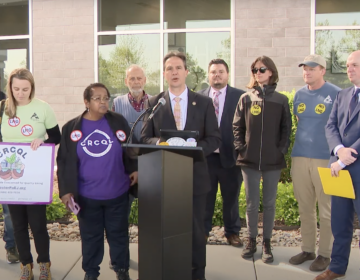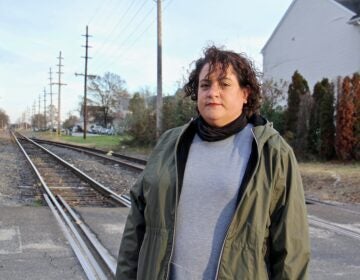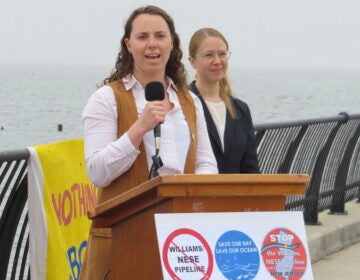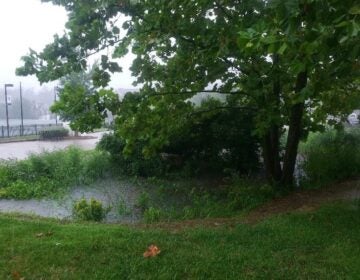Gibbstown LNG by rail proposal hits another roadblock
The controversial 200-mile transport of liquified natural gas from Bradford County, Pa., to a terminal along the Delaware River has hit another roadblock.
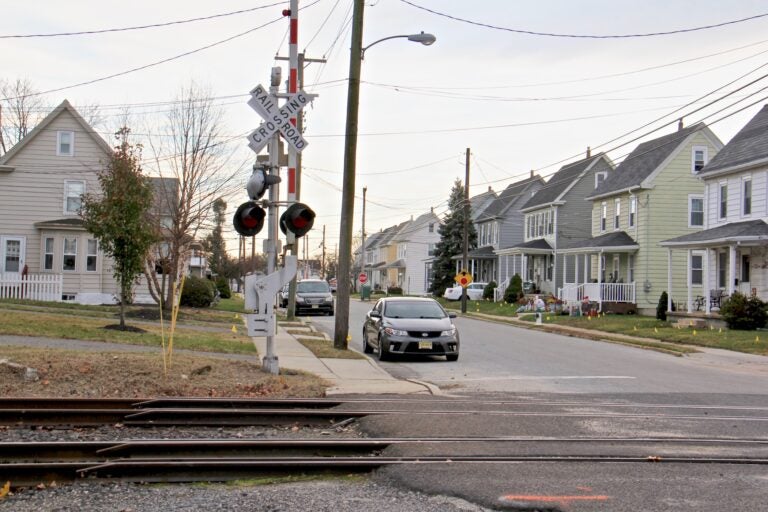
Homes line North Repauno Avenue in Gibbstown, a few blocks from the entrance to the Repauno Port and Rail Terminal. (Emma Lee/WHYY)
This story is part of the WHYY News Climate Desk, bringing you news and solutions for our changing region.
From the Poconos to the Jersey Shore to the mouth of the Delaware Bay, what do you want to know about climate change? What would you like us to cover? Get in touch.
A plan to transport liquified natural gas by rail along the Delaware River has hit another roadblock.
The Pipeline and Hazardous Materials Safety Administration on Monday denied Energy Transport Solutions, a subsidiary of New Fortress Energy, a permit extension.
Approval of the permit would have allowed the company to take fracked gas from the Marcellus Shale, compress it into flammable liquified natural gas (LNG) at a plant in Wyalusing, Pa., and transport it by rail to Gibbstown, New Jersey, where it would then be shipped overseas.
Last year, New Fortress Energy agreed to halt the plan after reaching a settlement with environmental groups that filed suit seeking to overturn the company’s air emissions permit.
Environmentalists say the proposal would pollute the air and contribute to climate change. Safety is a concern for those living along the proposed path of the train, one of the most densely populated areas of the East Coast. The recent derailment of a train carrying vinyl chloride in East Palestine, Ohio, has increased scrutiny of rail safety and regulations.
Opponents of the New Fortress Energy plan say they can breathe a sigh of relief — at least for now.
“[The permit denial] is certainly a good thing for anyone who lives along a potential route for this type of transport,” said Tom Schuster, director of the Pennsylvania chapter of the Sierra Club, which was a part of last year’s legal settlement.
“It’s a good thing for emergency responders who might have to be in harm’s way if an accident were to happen. And it’s a good thing for the climate.”
New Fortress Energy did not immediately respond to a request for comment. The company’s next steps are unclear.
PHMSA had approved a rarely issued special permit to move the LNG by rail in December 2019. It would have allowed two 100-car trains to transport the gas each day about 200 miles from Bradford County, across the Delaware River, and into South Jersey.
Separately, the Trump administration opened up LNG by rail transport options in 2020 by allowing companies to apply for a regular permit.
Environmentalists have called upon the Biden administration to put an end to that change. In 2021, the PHMSA proposed to suspend the transport of LNG by rail. However, the proposed rules have not yet been implemented.
When asked why the agency denied the permit renewal, a spokesperson pointed to last year’s settlement, stating in an email: “Prior to the denial, the project to transport LNG for foreign export was already halted by Energy Transfer Solutions as part of a legal settlement with external litigants.”
While its original permit was issued in 2019, New Fortress Energy’s proposed project was delayed because of the “pandemic, massive supply chain and workforce disruptions, and widespread economic and political uncertainties,” according to the company.
New Fortress Energy doesn’t need permission to transport LNG by truck, however, which is also opposed by environmentalists and community members concerned about safety.
“The transport by truck is extremely dangerous as well. It goes to communities, it goes on our public highways, and it’s subject to a high incidence of truck and traffic accidents,” said Tracy Carluccio of the Delaware Riverkeeper Network, which has advocated against the LNG proposal.
“They can explode, they can catch on fire, they can kill people. Even though it’s not the same volume in one location as a train of 100 cars would be, it is still very dangerous and we are opposed to that.”

Get daily updates from WHYY News!
WHYY is your source for fact-based, in-depth journalism and information. As a nonprofit organization, we rely on financial support from readers like you. Please give today.



